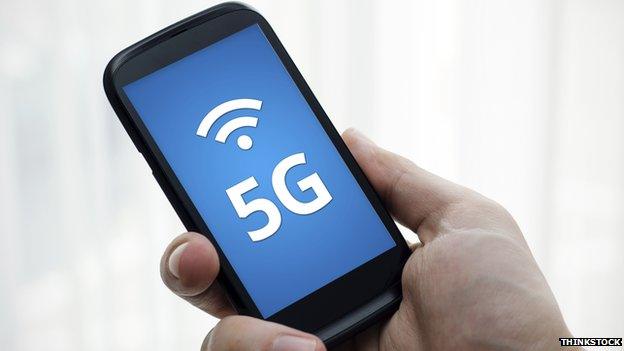5G researchers manage record connection speed
- Published

Ofcom has said that 5G mobile data could be available in Britain by 2020
Record-breaking speeds have been achieved during tests of 5G data connections, scientists have said.
Researchers at the University of Surrey's 5G Innovation Centre (5GIC) managed one terabit per second (Tbps) - many thousands of times faster than current data connections.
The head of the 5GIC said he hoped to demonstrate the technology to the public in 2018.
Ofcom has said 5G could be available in Britain by 2020.
At 1Tbps, it would be theoretically possible to download a file 100 times the size of a feature film in about three seconds. The speed is more than 65,000 times faster than average 4G download speeds.
It is also far in excess of the previous best achieved in tests: Samsung's 7.5 gigabits per second (Gbps), which is less than 1% of the Surrey team's speed.
According to news website V3, external, 5GIC director Prof Rahim Tafazolli said: "We have developed 10 more breakthrough technologies and one of them means we can exceed 1Tbps wirelessly. This is the same capacity as fibreoptics but we are doing it wirelessly."
His research team built its own kit and carried out the tests in lab conditions over a distance of 100m.
'Step change'
It remains to be seen whether it will be possible to replicate the speeds in real-world conditions. Prof Tafazolli said he wanted to carry out more tests around the university's campus before going public.
"We want to be the first in the world to show such high speeds," he said.
The regulator Ofcom has been supportive of efforts to get 5G to the public and, last month, it called for input from the industry on how to go about it.
It has said that 5G would be able to use very high-frequency spectrum - above 6 GHz - to run a range of services - from holographic projections to financial trading.
The regulator said it expected 5G mobile to be capable of delivering between 10 and 50Gbps, compared with the 4G average download speed of 15Megabits per second (Mbps).
Speaking as Ofcom launched its consultation in January this year, its acting chief executive Steve Unger said: "5G must deliver a further step change in the capacity of wireless networks, over and above that currently being delivered by 4G."
The breakthrough by the 5GIC team brings that one step closer. But Prof Tafazolli said there were hurdles to overcome before 5G would be ready
"An important aspect of 5G is how it will support applications in the future. We don't know what applications will be in use by 2020, or 2030 or 2040 for that matter, but we know they will be highly sensitive to latency.
"We need to bring end-to-end latency down to below one millisecond so that it can enable new technologies and applications that would just not be possible with 4G," he told V3.
- Published1 December 2014

- Published13 May 2013

- Published8 October 2012
